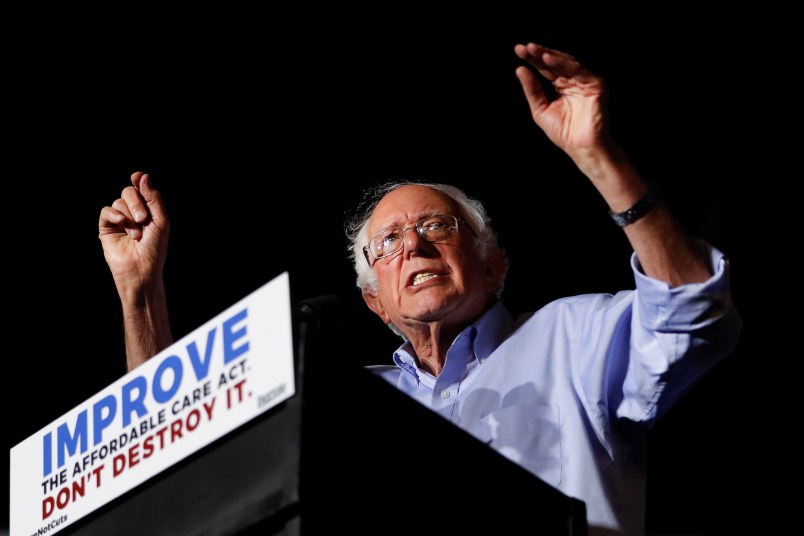There have been several articles by liberals warning against the embrace of Bernie Sanders’ “Medicare for All” plan, the latest version of which he will unveil today. To wit: it’s politically dangerous because it would require large tax increases; the opposition from the insurance/hospital/medical/pharmaceutical lobbies would be ferocious; and we can get to the same destination through less controversial incremental reforms of Obamacare. I’ve made some of these arguments myself. But I want to make the opposite case for the moment. Here’s why Sanders’ approach makes sense:
An effective politics needs a horizon that voters look toward. It’s “horizonal.” Franklin Roosevelt’s New Deal; John Kennedy’s New Frontier; Ronald Reagan’s tax cut and “A rising tide lifts all boats”; Bill Clinton’s “putting people first” health plan in 1992; yes, Donald Trump’s wall and making America great again. John Kerry’s campaign in 2004 and Hillary Clinton’s campaign in 2016 had no horizon. They were mired in details or in “I’m with HER” and “stronger together” identity politics.
Medicare for All is a horizonal demand. It satisfies a basic need and does so by looking beyond the corrupt, meretricious system we now have. The activity of private insurance companies symbolize much that is wrong with contemporary capitalism. You don’t have to be a leftwinger from Park Slope to hate these companies. Believe me: a lot of those people who voted for Trump (whom the liberal elite dismisses as racists and misogynists) hate insurance companies.
While Medicare for All would cause an upheaval in the health insurance markets, it is actually based on expanding a system that works and that has remained intact for over fifty years. It’s incremental in its own way. It is also very easy to understand, while most of the incremental reforms I’ve seen require a degree in healthcare economics to comprehend and rarely seem to apply to “you.”
What would happen if Democrats actually ran on a platform of “Medicare for all”? Maybe Republicans would be able to discredit them by pointing to higher taxes. Or maybe Democrats could finesse the “who pays” issue as Bill Clinton did in 1992 or Barack Obama did in 2008. Or maybe they could propose as a transition Paul Starr’s compelling case for “midlife Medicare” that would begin by offering Medicare to people ages 50 to 64, a version of which Bill Clinton proposed at the beginning of his second term before he got derailed by the Monica Lewinsky scandal.
For the moment, though, Sanders’ and the fifteen co-sponsors’ support of Medicare for All – for its potential political pitfalls – is a step forward for a Democratic party that has been mired in thinktank incrementalism (see “a Better Deal”) and identity politics. It gives them something to talk about that an average voter and not just a policy wonk can understand.






